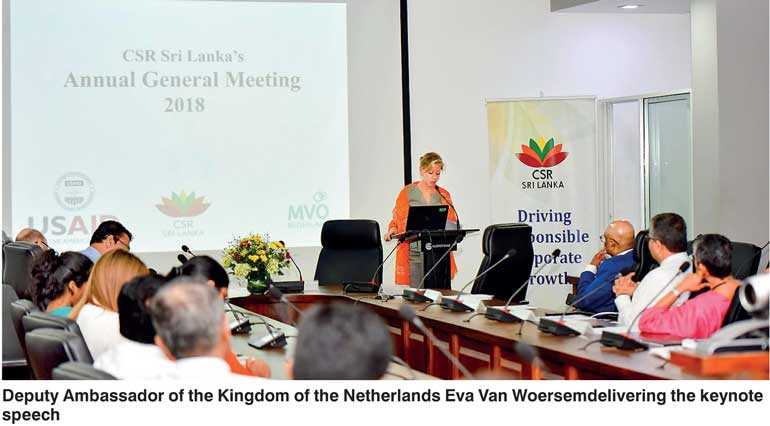Monday Feb 23, 2026
Monday Feb 23, 2026
Monday, 1 October 2018 00:27 - - {{hitsCtrl.values.hits}}

CSR Sri Lanka had its 5th Annual General Meeting on 20 September, from 5.00pm to 7.00pm at the “Sankathani” Auditorium of Sri Lanka Institute of Development Administration (SLIDA),attended by the Member Companies, some distinguished guests and other invitees.
To mark the theme of the day, CSR Sri Lanka had organised a keynote speech on ‘Opportunities for a circular economy through the international collaborations on sustainable & inclusive business’,delivered by Deputy Ambassador of the Kingdom of the Netherlands, Eva Van Woersem, who inspired the audience with the knowledge and insights shared.
The keynotespeech identified the need for more efficient use of raw materials as one of the key challenges of the 21st century. Vital change of usage is required to ensure a safe and healthy environment for future generations. The circular economy emerges to address those challenges through both social and technological innovations.
“The Netherlands is working hard to achieve an economy without waste, an economy that reuses raw materials. We want to have a completely circular economy by 2050. Now, already, 81% of our waste is being recycled. The next step is eco-designing. Saying no to products that can’t be reused. Reuse will become the standard. A new economy. A new design,”said Deputy Ambassador Van Woersem.
She further explained how the Netherlands translates this concept into policy. In the past, the Dutch agricultural sector mainly focused on cost reduction, increased production and upscaling. This generated food security and prosperity in the Netherlands. However, this approach asked a lot from nature and climate. In the new vision, agricultural subsectors, for example horticulture and animal husbandry, use each other’s residual streams as input. This cooperation between different sectors leads to a closed food chain, and thus, will continue to ensure food security and prosperity in the future.
Moving to the Sri Lankan industry sectors, Deputy Ambassador Van Woersem stated that the ‘Garments without Guilt’campaign of the Sri Lankan apparel manufacturers verifies that the Sri Lankan textile industry is already performing on a rather high CSR standard, which creates opportunities for export to modern world consumers, who demand awareness as to under which conditions their clothes are made.
However, she mentioned that in the agri-food industry of Sri Lanka, there are a number of opportunities to reduce food losses and reusing waste through a more efficient product chain, where agricultural losses will be minimised, and an ecological sustainable food system could be created.
The tourism industry of Sri Lanka could also develop itself as a sustainable tourism hotspot; a ‘zero waste’ destination, which would be a unique selling point to distinguish itself from other destinations worldwide.
“If you approach the market with an open mind, you will see that there are many opportunities in the circular economy and sustainable and inclusive business,”said Deputy Ambassador Van Woersem. “Partnerships are essential. Not only the public sector can make a change, but also the private sector has a role to play. By adopting sustainable practices, they can gain competitive advantage, increase their market share, and boost stakeholder value. All while having a positive impact on the world.”
Concluding the keynote speech, Deputy Ambassador Van Woersem portrayed an act of her Minister for Foreign Trade and Development Cooperation Sigrid Kaag, wearing a 100% recycled dress while heading a trade mission to India earlier this year. The International Community has welcomed it warmly, which has enabled the Minister to set an example of using circular products, succeeding in her goal to create awareness. She specified that such examples can drive a revolution which the textile industry has awaited for a long time.
CSR Sri Lanka will be initiating the carrying forward of the circular economy practices discussed in the keynote speech by cultivating sectorial collaborations, and welcome the involvement of interested stakeholders to join hands with them.